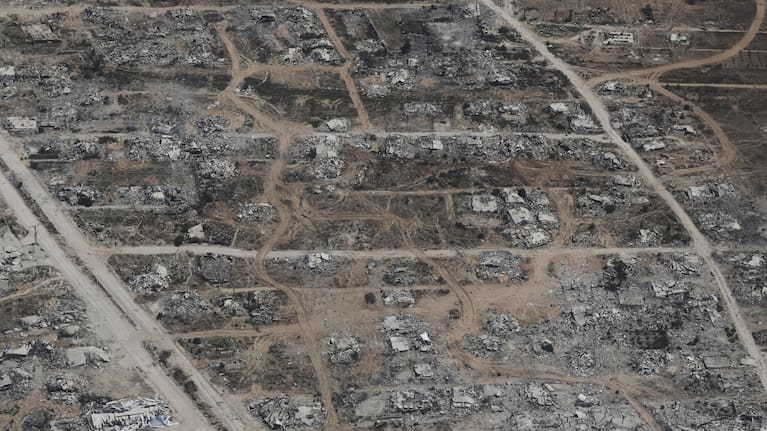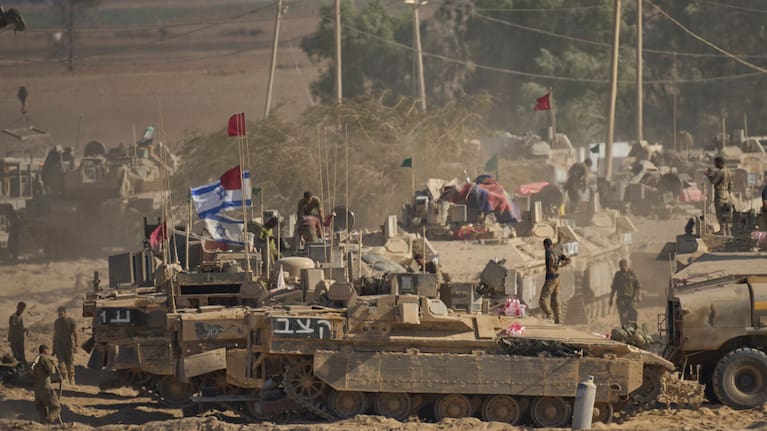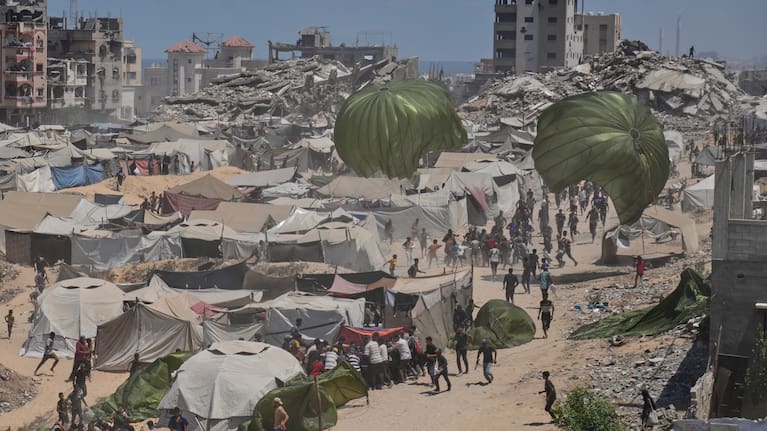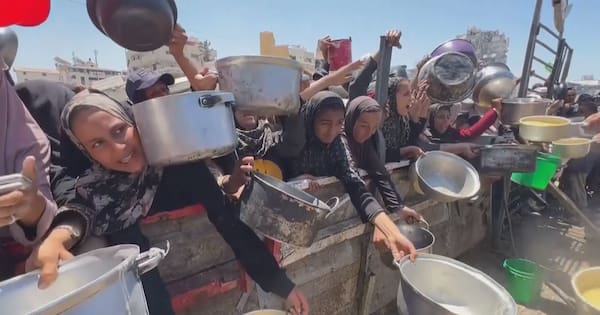Israel’s Security Cabinet has approved a plan to take over Gaza City, Prime Minister Benjamin Netanyahu’s office said.
The decision taken on Friday marks another escalation of Israel’s 22-month offensive launched in response to Hamas’ October 7 attack.
The war has already killed tens of thousands of Palestinians, destroyed much of Gaza and pushed the territory of some 2 million Palestinians toward famine.
Ahead of the Security Cabinet meeting, Netanyahu said Israel planned to retake control over the entire territory and eventually hand it off to friendly Arab forces opposed to Hamas.
The announced plans stopped short of that, perhaps reflecting the reservations of Israel’s top general, who reportedly warned that it would endanger the remaining 20 or so living hostages held by Hamas and further strain Israel’s army after nearly two years of regional wars. Many families of hostages were also opposed, fearing further escalation would doom their loved ones.
Israeli security council agrees to PM’s wish to take full control of the territory before turning it over to Arab forces. (Source: 1News)
Israel has repeatedly bombarded Gaza City and carried out numerous raids there, only to return to different neighbourhoods again and again as militants regrouped. Today, it was one of the few areas of Gaza that hadn’t been turned into an Israeli buffer zone or placed under evacuation orders.
A major ground operation there could displace tens of thousands of people and further disrupt efforts to deliver food to the territory.
It’s unclear how many people resided in the city, which was Gaza’s largest before the war. Hundreds of thousands fled Gaza City under evacuation orders in the opening weeks of the war, but many returned during a ceasefire at the start of this year.
Expanding war risks countless lives and could further isolate Israel

Expanding military operations in Gaza would put the lives of countless Palestinians and the roughly 20 remaining Israeli hostages at risk while further isolating Israel internationally. Israel already controlled around three-quarters of the devastated territory.
Families of hostages held in Gaza feared an escalation could doom their loved ones, and some protested outside the Security Cabinet meeting in Jerusalem. Former top Israeli security officials had also come out against the plan, warning of a quagmire with little added military benefit.
An Israeli official had earlier said the Security Cabinet would discuss plans to conquer all or parts of Gaza not yet under Israeli control. The official, speaking on condition of anonymity pending a formal decision, said that whatever was approved would be implemented gradually to increase pressure on Hamas.
Israel’s air and ground war has killed tens of thousands of people in Gaza, displaced most of the population, destroyed vast areas and caused severe and widespread hunger. Palestinians were braced for further misery.
“There is nothing left to occupy,” said Maysaa al-Heila, who is living in a displacement camp. “There is no Gaza left.”
At least 42 Palestinians were killed in Israeli airstrikes and shootings across southern Gaza on Thursday, according to local hospitals.
‘We don’t want to keep it’

Asked in an interview with Fox News ahead of the Security Cabinet meeting if Israel would “take control of all of Gaza,” Netanyahu replied: “We intend to, in order to assure our security, remove Hamas there, enable the population to be free of Gaza.”
“We don’t want to keep it. We want to have a security perimeter,” Netanyahu said in the interview. “We want to hand it over to Arab forces that will govern it properly without threatening us and giving Gazans a good life.”
The Security Cabinet, which was needed to approve such a decision, began meeting Thursday evening (local time), according to Israeli media.
Israel’s military chief of staff, Lieutenant General Eyal Zamir, warned against occupying Gaza, saying it would endanger the hostages and put further strain on the military after nearly two years of war, according to Israeli media reports.
Hamas-led militants abducted 251 people and killed around 1200 in the October 7, 2023, attack that triggered the war. Most of the hostages have been released in ceasefires or other deals but 50 remain inside Gaza, around 20 of them believed by Israel to be alive.
Almost two dozen relatives of hostages set sail from southern Israel towards the maritime border with Gaza on Thursday, where they broadcast messages from loudspeakers.
Yehuda Cohen, the father of Nimrod Cohen, an Israeli soldier held in Gaza, said from the boat that Netanyahu was prolonging the war to satisfy extremists in his governing coalition. Netanyahu’s far-right allies wanted to escalate the war, relocate most of Gaza’s population to other countries and reestablish Jewish settlements that were dismantled in 2005.
“Netanyahu is working only for himself,” Cohen said.
Palestinians killed and wounded as they seek food

Israel’s military offensive has killed over 61,000 Palestinians, according to Gaza’s Health Ministry, which did not say how many were fighters or civilians. The ministry was part of the Hamas-run government and staffed by medical professionals who keep and share detailed records.
The United Nations and independent experts viewed the ministry’s figures as the most reliable estimate of casualties. Israel has disputed them without offering a toll of its own.
Of the 42 people killed on Thursday (local time), at least 13 were seeking aid in an Israeli military zone in southern Gaza where UN aid convoys were regularly overwhelmed by looters and desperate crowds. Another two were killed on roads leading to nearby sites run by the Israeli-backed Gaza Humanitarian Foundation, an American contractor, according to Nasser Hospital, which received the bodies.
GHF said there were no violent incidents at or near its sites on Thursday (local time). There was no immediate comment from the Israeli military. The military zone, known as the Morag Corridor, was off limits to independent media.
Hundreds of people have been killed in recent weeks while heading to GHF sites and in chaotic scenes around UN convoys, most of which are overwhelmed by looters and crowds of hungry people. The UN human rights office, witnesses and health officials say Israeli forces have regularly opened fire toward the crowds going back to May, when Israel lifted a complete two and open half month blockade.
The military said it only fired warning shots when crowds approached its forces. GHF said its armed contractors had only used pepper spray or fired into the air on some occasions to prevent deadly stampedes.
Israel and GHF face mounting criticism

Doctors Without Borders, a medical charity known by its French acronym MSF, published a blistering report denouncing the GHF distribution system. “This is not aid. It is orchestrated killing, ” it said.
MSF ran two health centres very close to GHF sites in southern Gaza and said it had treated 1380 people injured near the sites between June 7 and July 20, including 28 people who were dead upon arrival. Of those, at least 147 had suffered gunshot wounds — including at least 41 children.
MSF said hundreds more suffered physical assault injuries from chaotic scrambles for food at the sites, including head injuries, suffocation, and multiple patients with severely aggravated eyes after being sprayed at close range with pepper spray. It said the cases it saw were only a fraction of the overall casualties connected to GHF sites; a nearby Red Cross field hospital hasd independently reported receiving thousands of people wounded by gunshots as they sought aid.
“The level of mismanagement, chaos and violence at GHF distribution sites amounts to either reckless negligence or a deliberately designed death trap,” the report said.
GHF said the “accusations are both false and disgraceful” and accused MSF of “amplifying a disinformation campaign” orchestrated by Hamas.
The US and Israel helped set up the GHF system as an alternative to the UN-run aid delivery system that has sustained Gaza for decades, accusing Hamas of siphoning off assistance. The UN denieds any mass diversion by Hamas. It accused GHF of forcing Palestinians to risk their lives to get food and said it advanced Israel’s plans for further mass displacement.

